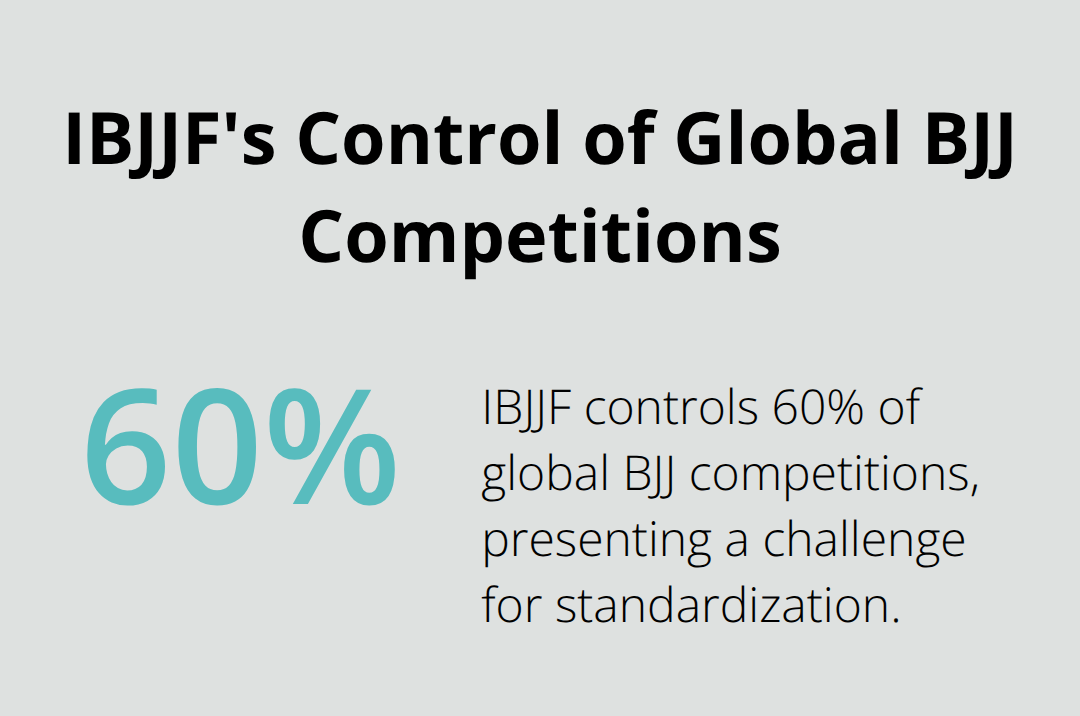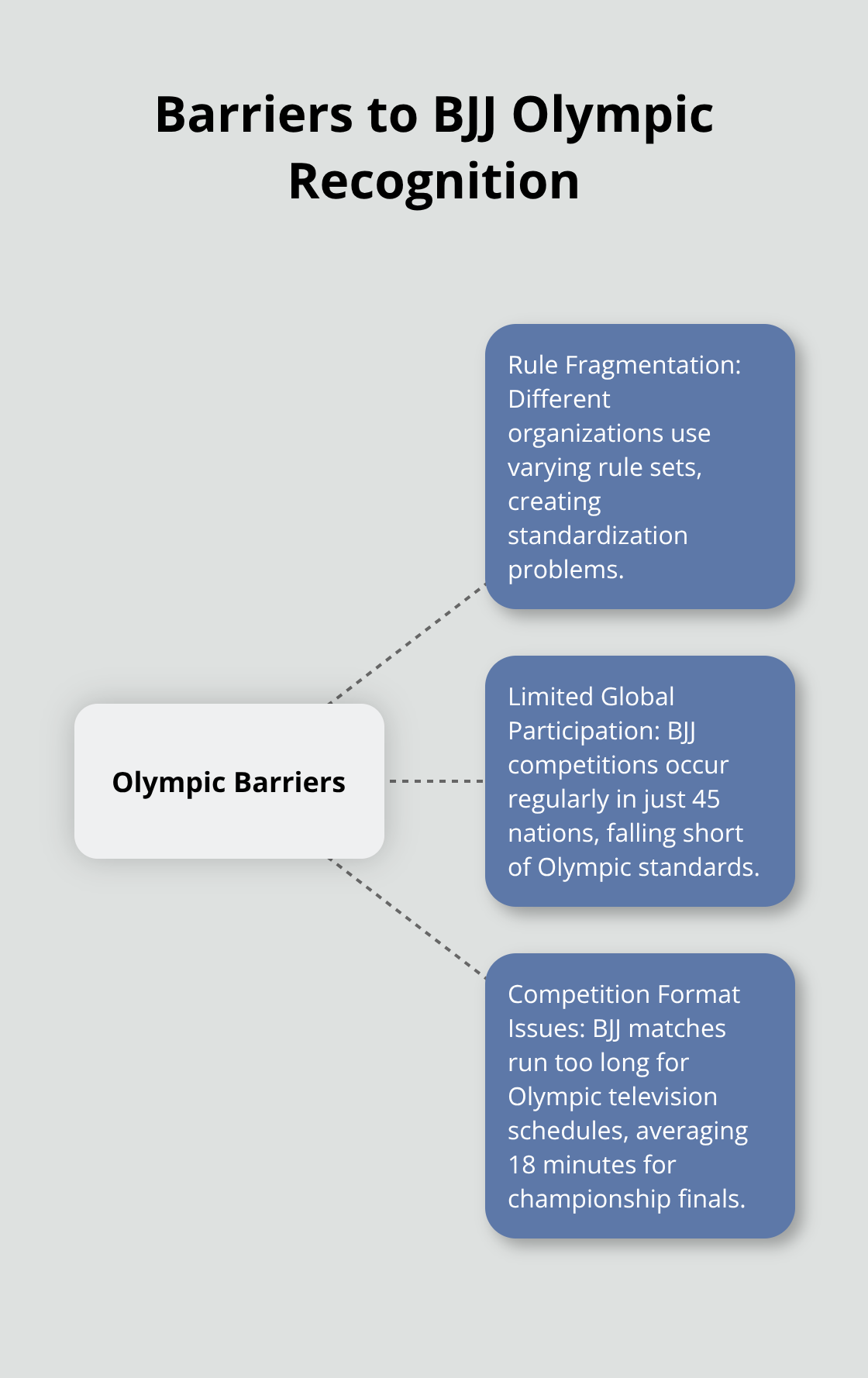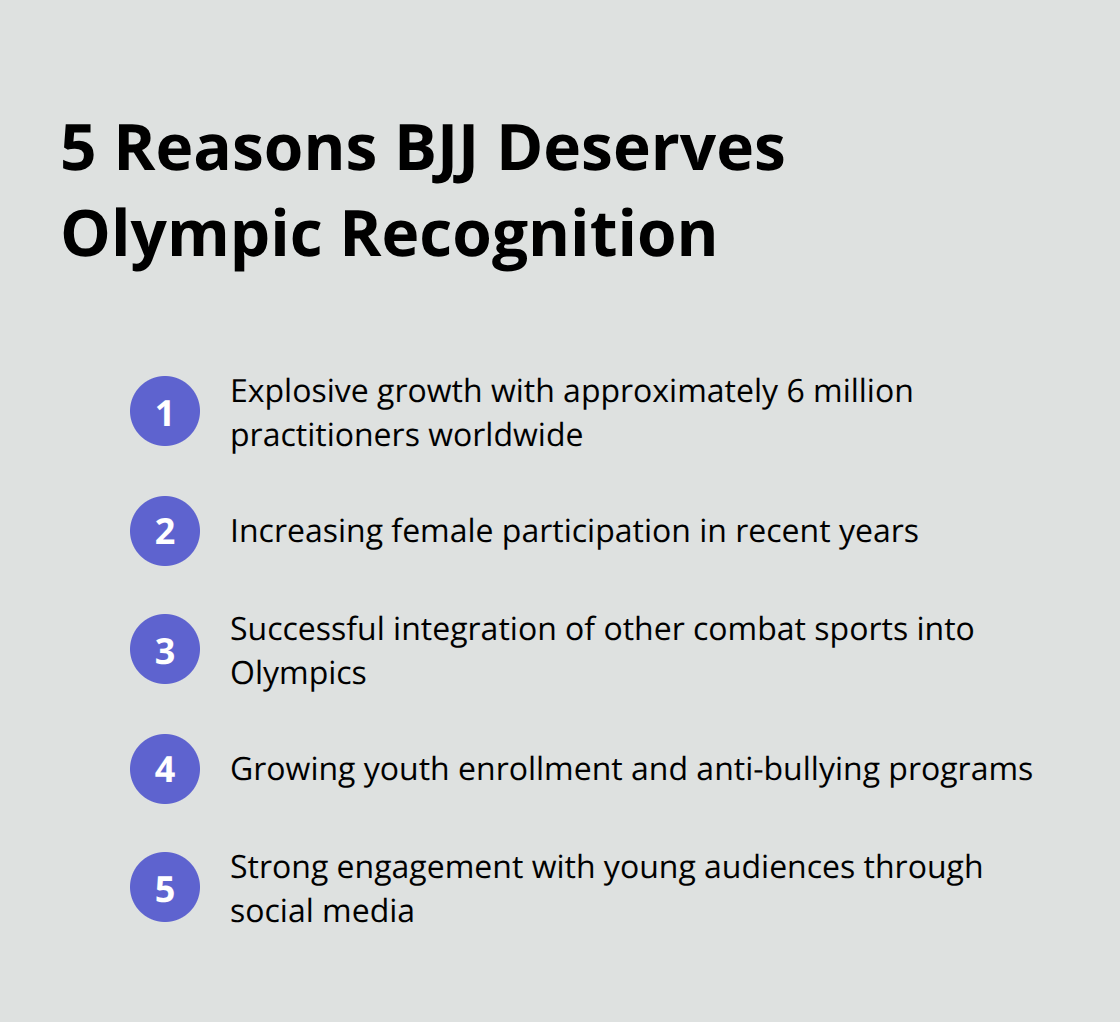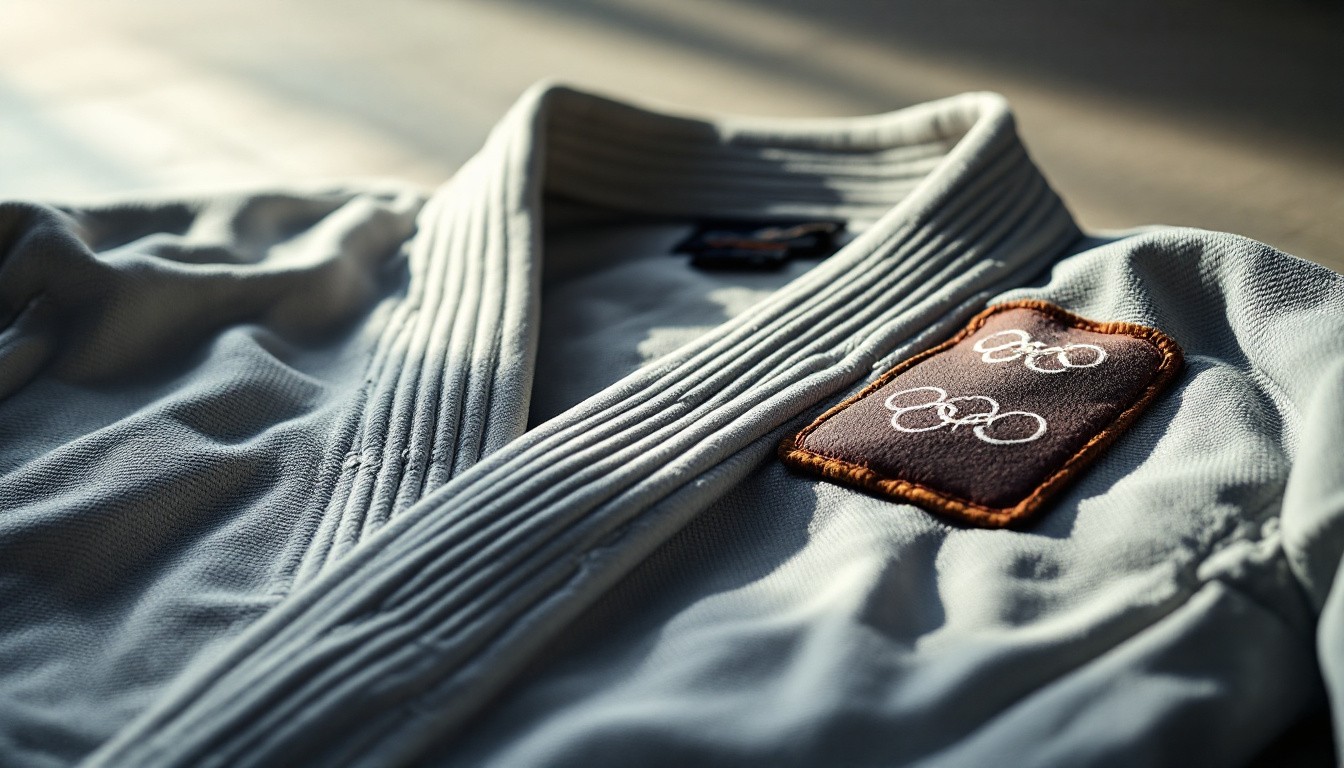Brazilian Jiu-Jitsu has exploded in popularity worldwide, with over 3 million practitioners across 180 countries. The sport continues gaining momentum through major competitions and celebrity endorsements.
At Jiu Jitsu, we see growing discussions about Olympic Jiu Jitsu inclusion. The International Olympic Committee faces pressure to add BJJ as combat sports viewership increases by 15% annually.
The path forward involves complex challenges around standardization and global governance that could determine BJJ’s Olympic future.
Where Does BJJ Stand with Olympic Officials
The International Olympic Committee has not formally recognized Brazilian Jiu-Jitsu as an Olympic sport due to several key challenges, notably the need for a unified global governing body. The IBJJF represents approximately 2.8 million registered practitioners globally, but the IOC requires unified governance structures that BJJ currently lacks. Multiple organizations (including the World Jiu-Jitsu Federation and Abu Dhabi Combat Club) operate with different rule sets, which creates fragmentation that Olympic officials view as problematic for standardization.
Olympic Judo vs BJJ Competition Rules
Olympic judo matches last four minutes with golden score overtime, while IBJJF competitions run six to ten minutes based on belt level. Judo awards ippon for throws that land opponents on their backs, which ends matches immediately. BJJ uses a point system where takedowns earn two points, guard passes score three points, and submissions win matches outright. The International Judo Federation simplified its rules for television audiences and removed leg grabs in 2010 to increase throw attempts. BJJ’s complex point system and ground-focused approach create longer matches that average 8.3 minutes compared to judo’s 2.7-minute average match duration (according to competition data from major tournaments).
Standardization Challenges That Block Olympic Progress
The IBJJF controls 60% of global BJJ competitions but faces resistance from regional federations that use modified rules. European tournaments often allow heel hooks at brown belt level, while IBJJF restricts them to black belts only. Time limits vary from five minutes in some local competitions to fifteen minutes in submission-only formats. Weight class divisions differ between organizations, with some that use 16 categories and others that implement 12. The IOC demands single bodies that govern Olympic sports, as demonstrated when karate unified under the World Karate Federation before Tokyo 2020 inclusion.

These structural issues present significant barriers, but the next major challenge involves BJJ’s global reach and participation rates compared to established Olympic sports.
What Barriers Stop BJJ from Olympic Recognition
Brazilian Jiu-Jitsu faces three major obstacles that prevent Olympic inclusion, with rule fragmentation as the most damaging factor. The IBJJF uses a point system where mount positions earn four points and knee-on-belly scores two points, while ADCC tournaments award points only for dominant positions that last three seconds. Some European federations permit reaping attacks at brown belt level, but IBJJF restricts these techniques to black belts only. The World Jiu-Jitsu Federation operates with entirely different time limits and runs matches for eight minutes compared to IBJJF’s ten-minute black belt divisions.

Rule Systems Create Olympic Roadblocks
Olympic sports require unified governance structures, as demonstrated when karate consolidated under the World Karate Federation before Tokyo 2020 inclusion. The IOC rejected wrestling’s initial bid in 2013 partly due to similar rule inconsistencies between freestyle and Greco-Roman divisions. BJJ organizations cannot agree on basic competition elements like legal techniques, match duration, or point values. This fragmentation makes standardization impossible and prevents the sport from meeting IOC requirements for unified international governance.
Global Participation Falls Short of Olympic Standards
BJJ participation drops significantly outside Brazil and the United States, with only 400,000 registered practitioners across all of Europe according to IBJJF data from 2024. Olympic inclusion typically requires active participation in 75 countries across four continents, but BJJ competitions occur regularly in just 45 nations. Swimming boasts 200 million participants globally, while athletics reaches 500 million people worldwide through school programs and local clubs.
BJJ’s 3 million practitioners pale against these numbers, and media viewership reflects this gap. The IBJJF World Championships drew 2.8 million online viewers in 2023, while Olympic judo attracted 47 million viewers during Tokyo 2020. Television broadcasters pay premium rates for Olympic content, but BJJ matches average 12,000 viewers on streaming platforms.
Competition Format Creates Schedule Problems
BJJ matches run too long for Olympic television schedules, with championship finals that average 18 minutes (including overtime periods). Olympic judo matches last 6.2 minutes on average including golden score extensions and fit perfectly into broadcast windows that maximize advertising revenue. The IOC limits Olympic sessions to 3.5 hours maximum to maintain viewer engagement, but a 16-person BJJ bracket requires 4.8 hours to complete according to tournament data from major competitions.
Weight cutting protocols in BJJ differ dramatically from Olympic standards, with some athletes who lose 15 pounds in 24 hours compared to same-day weigh-ins required for Olympic wrestling. Television networks demand predictable schedules, but submission-only matches can extend beyond 20 minutes without resolution.
These format challenges compound the sport’s governance issues, but BJJ supporters present compelling arguments for Olympic inclusion that address many of these concerns.
Why BJJ Deserves Olympic Recognition
Brazilian Jiu-Jitsu has demonstrated the explosive growth patterns that Olympic sports require for inclusion. Approximately 6 million people practice Jiu Jitsu worldwide, with participation that increases annually. Female participation has grown significantly in recent years, reaching substantial numbers of active competitors worldwide. Countries across the globe continue adding new practitioners, while established markets see consistent growth in BJJ academies. These numbers exceed the participation rates that karate achieved before Tokyo 2020 inclusion, when the World Karate Federation counted 2.1 million active competitors globally.
Combat Sports Integration Shows Clear Olympic Path
The IOC successfully added karate to Tokyo 2020 despite multiple bodies that unified just eight years before inclusion. Wrestling faced similar standardization challenges in 2013 when the IOC temporarily removed it from Olympic programs, but rule modifications and organizational changes restored its status within two years. Judo evolved from traditional Japanese martial arts into an Olympic sport through systematic rule changes that increased action and reduced match duration. Taekwondo joined the Olympics in 1988 when it adopted electronic systems and standardized weight classes across all international competitions. BJJ can follow this proven integration model when it consolidates rule systems and establishes unified competition formats that television broadcasters demand.
Youth Programs Drive Olympic Sports Growth
BJJ youth enrollment has grown substantially in recent years, with school programs that expand across multiple states in America. The sport attracts diverse demographics through anti-bullying programs that teach self-defense without strikes, which makes it appealing to parents who avoid traditional martial arts. Youth BJJ competitions show sustained growth that Olympic officials value for long-term sport development. Countries invest heavily in youth Olympic sports programs, and BJJ’s emphasis on technique over size creates opportunities for smaller athletes who excel in traditional Olympic sports (like gymnastics and wrestling). The IOC prioritizes sports that engage young audiences through social media, and BJJ content generates billions of views annually on platforms like Instagram and TikTok according to social media analytics data.

Final Thoughts
Brazilian Jiu-Jitsu faces a realistic but challenging path toward Olympic inclusion. The sport must overcome significant barriers that include rule standardization across multiple bodies and increased global participation beyond its current 45 active competition countries. The IBJJF’s fragmented control over just 60% of competitions creates the primary obstacle that Olympic officials cannot ignore.
Olympic Jiu Jitsu inclusion appears possible within the next 8-12 years if the sport follows the proven integration model that karate and taekwondo used successfully. The IOC’s willingness to add new sports during Tokyo 2020 demonstrates openness to martial arts expansion, but BJJ organizations must unify their competition formats and point systems first. Olympic recognition would transform BJJ development through increased funds, youth programs, and global infrastructure investment.
Countries would establish national centers and coach certification programs that currently exist only in Brazil and the United States (the sport’s emphasis on technique over size aligns perfectly with Olympic values of skill-based competition). We at Jiu Jitsu believe this growth trajectory will accelerate as more practitioners join academies like Souza Grappling Co., which offers comprehensive programs that build the grassroots foundation Olympic sports require. The next decade will determine whether BJJ can overcome its organizational challenges and achieve the Olympic recognition its global community deserves.




